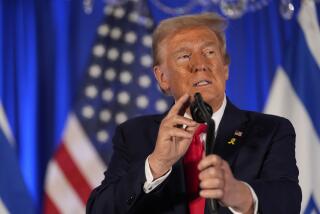Book says U.S. spied on Maliki, other top Iraqis
- Share via
WASHINGTON — The Bush administration has conducted an extensive spying operation on Iraqi Prime Minister Nouri Maliki, his staff and others in his government, according to a new book by Washington Post editor and author Bob Woodward.
“We know everything he says,” according to one of multiple sources Woodward cites about the practice in “The War Within: A Secret White House History 2006-2008,” scheduled for publication by Simon & Schuster on Monday.
The book also says the U.S. troop “surge” of 2007, in which President Bush sent nearly 30,000 additional U.S. forces to Iraq, was not the primary factor behind the steep drop in violence there during the last 16 months.
Rather, Woodward reports, “groundbreaking” covert techniques, beginning in 2007, enabled U.S. military and intelligence officials to locate and kill insurgent leaders and key individuals in extremist groups.
Woodward does not disclose the code names of the covert programs or provide much detail about them, saying in the book that White House and other officials cited national security concerns in asking him to withhold specifics.
Overall, Woodward writes, four factors combined to reduce the violence: the covert operations; the influx of troops; the agreement by militant cleric Muqtada Sadr to rein in his powerful Mahdi Army militia; and the so-called Anbar Awakening, in which tens of thousands of Sunnis turned against the insurgent group Al Qaeda in Iraq and allied with U.S. forces.
The 487-page book is Woodward’s fourth to examine the inner debates of the Bush administration and its handling of the wars in Iraq and Afghanistan. The book is based on more than 150 interviews with the president’s national security team, senior deputies and other key players in the intelligence, diplomatic and military communities. Woodward conducted two on-the-record interviews with Bush in May.
It portrays an administration split by dissent as the situation in Iraq deteriorated during the summer and early fall of 2006. Publicly, Bush said U.S. forces were “winning”; privately, he came to believe that the military’s long-term strategy of training Iraqi security forces and handing over responsibility to the new Iraqi government was failing.
In October 2006, the book says, Bush asked Stephen Hadley, his national security advisor, to lead a closely guarded review of the Iraq war. That first assessment did not include anyone from the military, however, and proceeded secretly because of White House fears that news coverage of a review might damage Republican chances in the midterm congressional elections.
According to Woodward, the president maintained an odd detachment from the reviews of war policy during this period, turning much of the process over to Hadley. “Let’s cut to the chase,” Bush told Woodward. “Hadley drove a lot of this.”
Responding to a question about how the White House settled on a troop surge of five brigades after the military leadership in Washington had reluctantly said it could provide two, Bush said: “OK, I don’t know this. I’m not in these meetings, you’ll be happy to hear, because I got other things to do.”
The book presents an evolving picture of the president’s decision making. On the one hand, it portrays Bush as detached, tentative and slow to react to the escalating violence in Iraq; on the other, after he decided that a surge was required, he is shown acting with focus and determination to move ahead with his plan in the face of strong resistance from his top military advisors.
More to Read
Sign up for our Book Club newsletter
Get the latest news, events and more from the Los Angeles Times Book Club, and help us get L.A. reading and talking.
You may occasionally receive promotional content from the Los Angeles Times.









